Why Has Making Choices Become So Difficult?
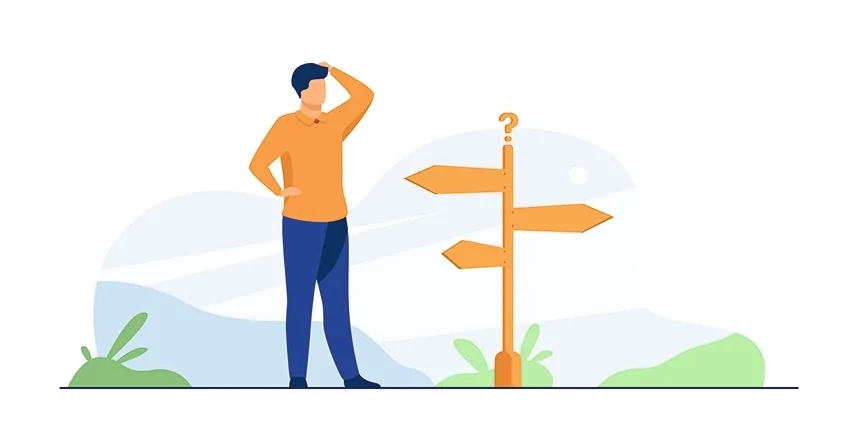
You're already running late, yet you're still standing in front of a wardrobe full of clothes, trying to pick something out. Nothing feels right, because surely there's a better option out there. Too formal, too casual, too bright, too warm, out of fashion… And yet, your wardrobe isn't filled with cheap items—it’s regularly updated and contains far more pieces than the average person had 50 years ago. So why are you frustrated and still not dressed? Because the issue isn’t the clothes—it’s how our approach to making even the most mundane decisions has changed.
Such situations have become everyday examples of a new psychological problem: making decisions has become difficult, even when they don’t carry much weight. We get overwhelmed when buying groceries at the supermarket, struggle to choose from a vast restaurant menu, and find purchasing clothes or even picking a movie for the evening to be daunting tasks. We spend hours reading reviews and watching tutorials because we’re afraid of making a mistake. After all, every choice means forgoing other options, each with its own advantages. As a result, when we make a decision, we immediately lose out on alternative possibilities. This leads to anxiety even when making routine choices, like selecting an outfit or a Netflix series. And when it comes to truly significant decisions—choosing a career, moving, relationships, or having a child—many of us get stuck in indecision or delay the choice as long as possible.
In some cases, the difficulty of choosing leads to a state known as “choice paralysis.” The brain freezes, preferring to avoid choosing altogether to protect us from the pain of regret. This phenomenon is especially pronounced when it’s rationally impossible to determine the best option among many.
So, is today’s abundance to blame for everything? After all, the concept of freedom of choice underpins democracy and a free economy, and generations have fought for the ability to have choices. Studies show that having too many options does make us less decisive, but the phenomenon of “choice paralysis,” as an extreme form of decision-making difficulty, has been made possible by a “perfect storm” of modernity—rising anxiety, depressive states, information overload, and social pressure.
In this article, we’ll explore why having many options doesn’t make us happier, why the desire to avoid mistakes traps us in indecision, and why it was much easier for our parents to make decisions. Most importantly, we’ll try to regain the ability to make choices easily and mindfully.
How Our Brain Is Supposed to Make Decisions
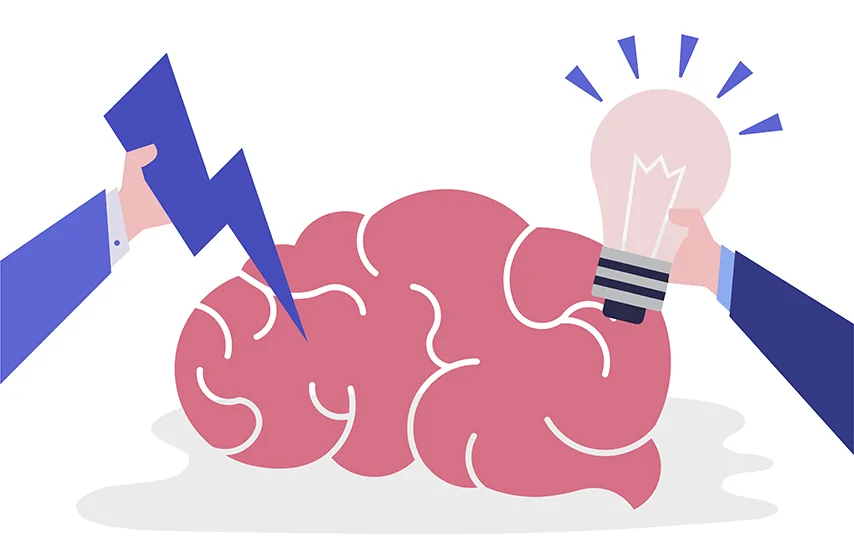
Let’s start with the fact that, evolutionarily, our brain is “wired” to choose the safest option available. Don’t eat an unfamiliar berry, don’t pet strange animals, don’t trust strangers—these are all examples of a loss-prevention mechanism that helped our ancestors survive. The principle of “a bird in the hand is worth two in the bush” still applies today, making us feel the pain of loss far more acutely than the joy of an equivalent gain. That’s why we try to avoid potential risks, even at the cost of missed opportunities. Yes, it’s our genetic memory that makes you cling to a “safe” but unfulfilling job until the very last moment.
This evolutionary caution suggests that, to make a decision, the brain must critically analyze the available options, consider potential losses, and rationally select the best one.
For centuries, decisions were more straightforward than they are today—“fight or flight,” not “choose the best career out of a hundred options.” Our ancestors simply needed to pick the safest option for survival, not weigh countless indistinguishable pros and cons.
Why This No Longer Works
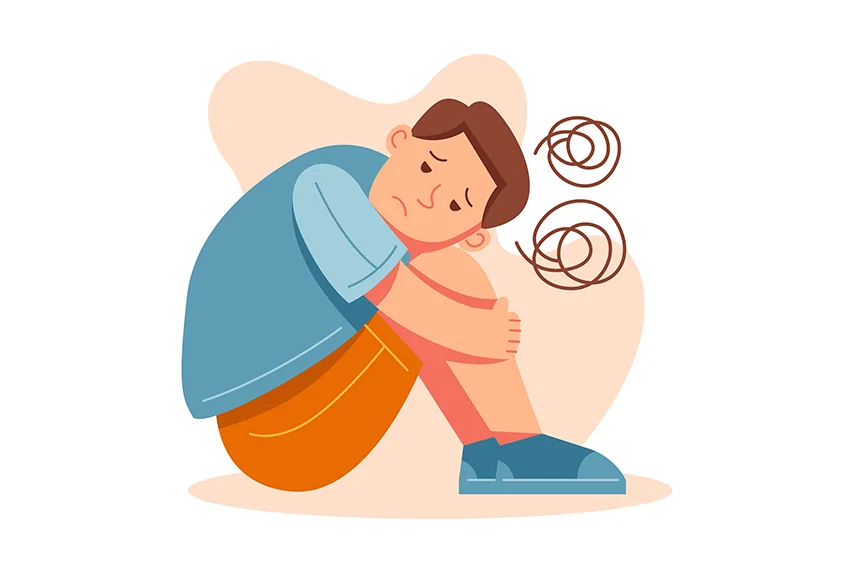
But what happens when there are too many options, their advantages and disadvantages aren’t clear, and there’s little time to decide? The brain simply “overheats”—the risk of making a mistake feels too high. And we hate making mistakes. Cognitive overload increases, and the complexity of each scenario makes it impossible to determine the optimal outcome. This only heightens anxiety, which further impairs our ability to make sound choices. It’s a vicious cycle.
On our website, you can take a free anxiety level test.
On the other hand, humans have never been as free as they are in modern society. We can choose where to live, what career to pursue, our religion, hobbies, and beliefs. But with this freedom, life has become far more dynamic, requiring us to make decisions quickly. This traps us in a situation where every choice feels potentially wrong, and every alternative feels like a missed opportunity. In such circumstances, the evolutionary approach simply stops being effective for several reasons, which we’ll explore below.
Abundance
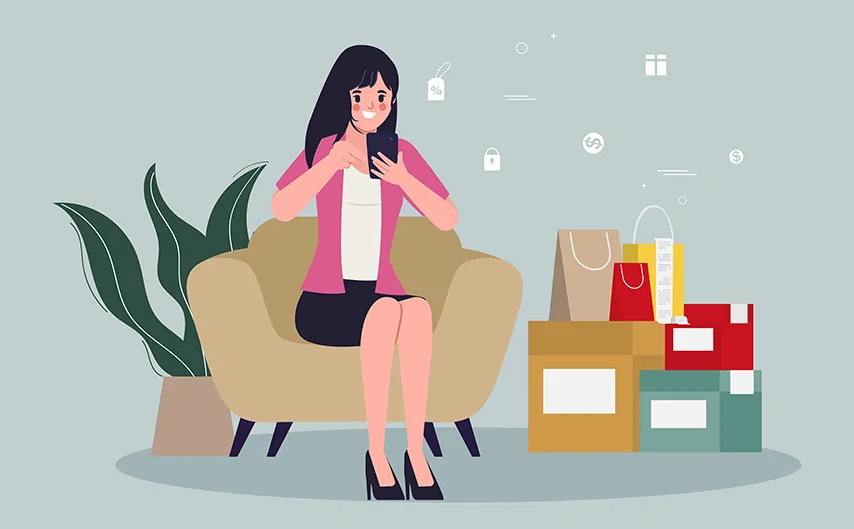
One of the most well-known researchers of the paradox of choice is psychologist Barry Schwartz. In his book, he argues that an increase in options doesn’t make people happier but instead generates stress, anxiety, and guilt over “imperfect” choices.
His findings sparked a wave of studies on consumer behavior. For example, a classic jam experiment conducted by Sheena Iyengar and Mark Lepper showed that supermarket shoppers presented with 6 jam options were ten times more likely to make a purchase than those faced with 24 options. In other words, more options = fewer decisions.
After these surprising results were published, the retail industry temporarily shifted toward reducing the number of options for consumers. However, it seems today’s young marketers are unaware of these studies and have reverted to overwhelming customers with variety.
This phenomenon applies to any decision, whether it’s choosing a career, a city to live in, or even a romantic partner. We are indeed more decisive when choices are limited. An interesting study by British researchers analyzed behavior during “speed dating” (where participants briefly meet multiple potential partners in a short time). They found that as the number of participants increased, the likelihood of someone choosing a partner decreased.
There’s no consensus on the “ideal” number of options, as it heavily depends on the individual and the complexity of the decision criteria. However, some studies suggest that the optimal number of options for effective decision-making ranges from 8 to 15.
Fatigue, Anxiety, and Depression
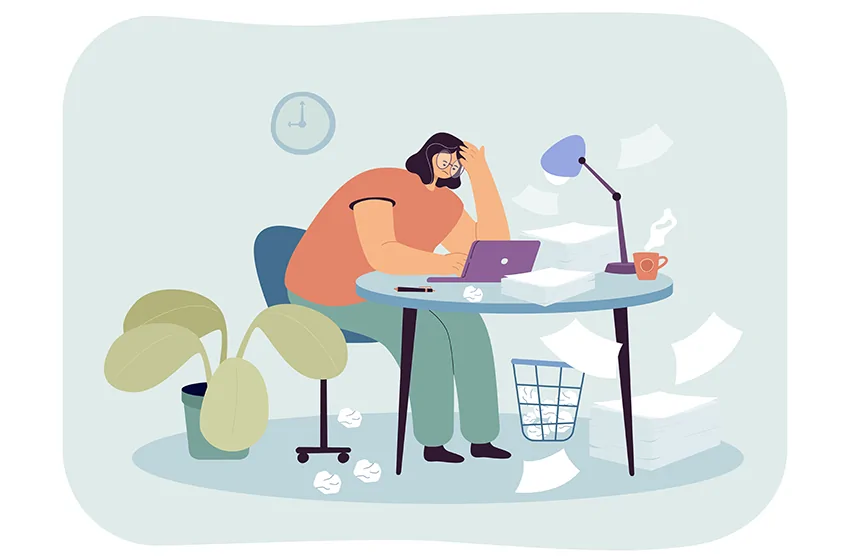
Our ancestors didn’t have the opportunities we have today; many knew from childhood what profession they’d pursue and where they’d live their entire lives. On one hand, this certainty limited freedom, but on the other, it preserved mental health. For example, this study by American psychologist Jean Twenge analyzes decades of psychological test data and notes a significant rise in stress, anxiety, and emotional instability. The increase in these issues impairs our analytical and planning abilities—qualities essential for decision-making.
In states of chronic fatigue, anxiety, or depression, we also tend to overestimate the risk of mistakes and underestimate our own abilities. As a result, we delay decisions or avoid them entirely to reduce stress and anxiety.
So, it was indeed easier for our parents to make decisions—not only because they had fewer options but also because their mental health was significantly better.
On our website, you can take a free depression test.
Information Overload
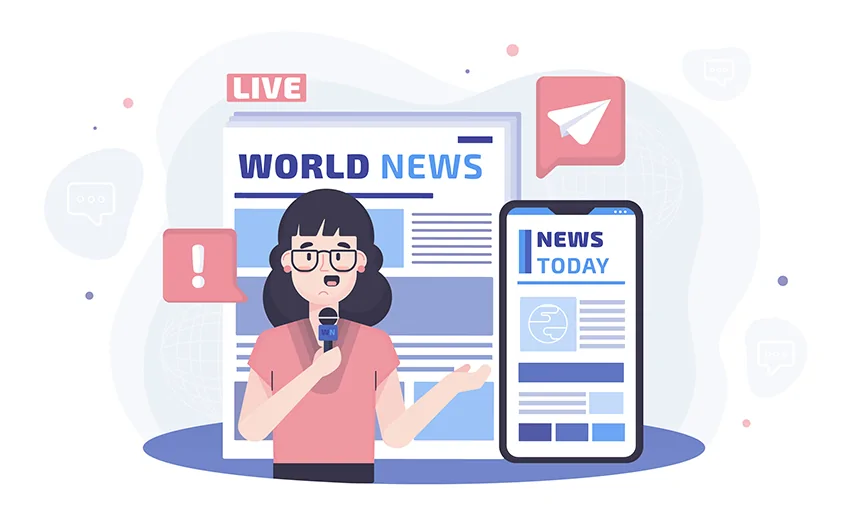
The internet and television have given us unprecedented access to information. But the more information we have, the harder it is to filter out what’s important and think critically. This requires our brain to expend energy, a limited resource. Psychologists call the state where a person can’t effectively process large amounts of information “information overload.” Most of us experience this regularly, and making decisions in such moments is incredibly difficult.
Thirty years ago (before the widespread use of the internet and social media),the level of information overload was significantly lower. As a result, people had better concentration and critical thinking skills, which are vital for decision-making.
On our website, you can take a free critical thinking test.
Fear of Judgment and Perfectionism
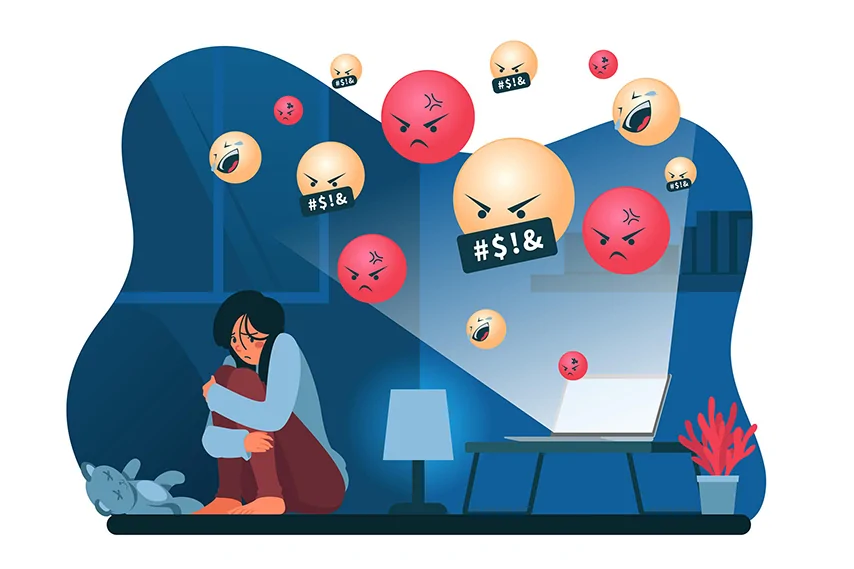
We observe others almost in real-time on social media, consciously or subconsciously comparing their lives to ours. We want approval, to be liked, to boast about our successes, and we definitely don’t want others to see our failures. In the past, a wrong choice might have been judged by family or close friends, but today, thanks to social media, you risk becoming the target of criticism or attacks from hundreds or even thousands of strangers.
In this “on-display” lifestyle and pursuit of perfection, the stakes of making a choice feel incredibly high. You don’t want to be upset by angry comments or face “cancellation,” do you? So, you make choices based not on personal preferences but on others’ expectations. This reduces satisfaction with your decisions (since they’re essentially imposed on you) and undermines internal motivation.
On our website, you can take a free perfectionism test.
Postponing Decisions
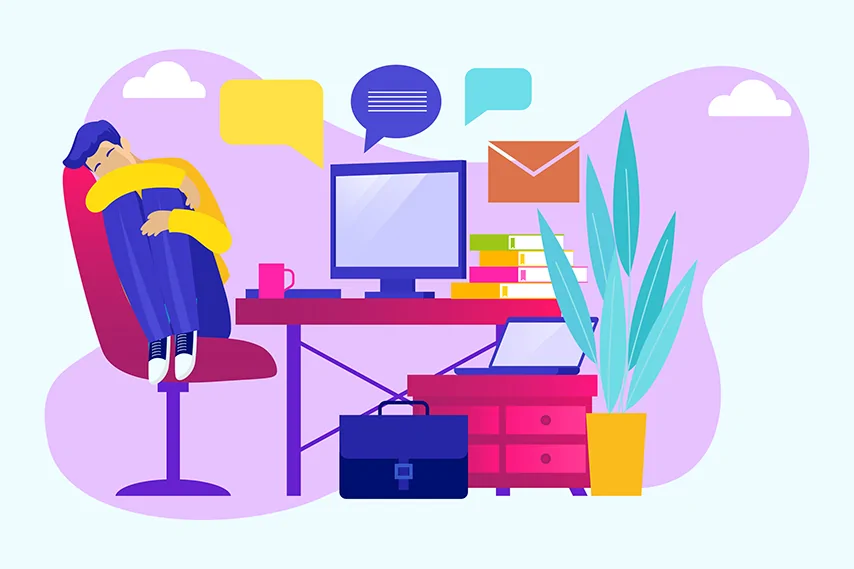
Fear of the unknown, conflicts, consequences, or responsibility can lead us to delay decisions until the last moment. Studies show that postponing decisions (procrastination) is an effective way to reduce cognitive strain. Many of us resort to this method quite often. When faced with a difficult choice, our brain opts for the path of least risk—not choosing at all. We hope that, with time, the situation will resolve itself, eliminating the need to decide.
At the same time, we may be fully aware that delaying decisions leads to negative consequences (e.g., missed deadlines, lost opportunities, financial losses). But the brain still succumbs to this temptation, as avoiding a choice temporarily relieves anxiety.
On our website, you can take a free Procrastination Test.
The Desire to Avoid Choice
Sometimes, we don’t want to have a choice at all, as it would make things simpler—circumstances would be to blame, not us. Surely, you’ve caught yourself thinking this way at least once. That’s why it’s so easy to follow orders; the responsibility lies with the one giving them. You can always reassure yourself: “I was just following instructions.” It’s also why collective decisions are easier, as responsibility is diluted among everyone, meaning no one truly bears it.
The mindset where a person perceives their life as controlled by external forces is called determinism. On our website, you can take a free “Free Will vs. Determinism” test.
Some fascinating studies show paradoxical results: in the case of medical diagnoses, people tend to hope for worse outcomes that leave them with no choice. This relieves them of the need to make difficult decisions or allows them to “hand over the reins” to doctors.
The higher the anxiety, fear of regret, and social pressure, the stronger the desire to let someone else make decisions for us. This is one reason for the popularity of algorithms, recommendations, diets, informational courses, and subscription services with pre-made solutions. These are all attempts to remove the burden of choice and restore a sense of predictability.
How to Escape the Trap of Difficult Choices
Can we improve our decision-making abilities? It’s clear that decision-making struggles correlate with levels of self-esteem, anxiety, depression, and emotional instability. These are fundamental issues for modern humans and aren’t easy to address. Working through them requires a comprehensive approach, significant effort, and time. But the result is worth it—calmness and self-confidence are the foundation of sound critical thinking and analytical skills.
Besides these fundamental aspects, there are also less obvious techniques that can help with decision-making:
Conserve Resources
Making any decision requires the brain to expend energy. Moreover, making well-considered decisions requires willpower, which is also a limited resource.
On our website, you can take a free willpower test.
What can you do?
- Minimize the number of decisions you make, especially those with low stakes. Steve Jobs famously wore the same black turtleneck to consciously avoid wasting resources on trivial choices like clothing.
- Don’t postpone decisions until the evening—by then, you may lack the resources for proper analysis. This could lead to impulsive choices just to feel relief or, conversely, freezing up even when the choice is obvious.
Make Choices Final
Learn to “burn bridges,” focus on the choice you’ve made, and work to make it the right one. If you keep the option to revert to alternatives, you subconsciously treat your choice as temporary, putting in less effort to make it successful. This applies to all areas of life: the possibility of returning to a former partner undermines current relationships; the option to return to your hometown or country reduces the chances of success after a move.
Psychologists call this the finality effect. According to this study, the sense that a choice is irreversible increases subjective satisfaction. When we know there’s no going back, the brain stops imagining “what could have been.” Instead, we start believing we made the best choice—not because it’s perfect, but because it’s final.
However, when a choice remains open, we mentally dwell on unrealized alternatives, preventing us from fully committing to the decision made.
Visualize Emotions
When making choices, we often try to weigh all the pros and cons but overlook an important factor—our own feelings. Try not just to think through the consequences but to imagine how you’ll feel a week, a month, or a year after the decision. What will bring inner comfort, and what will cause internal conflict? How calm and satisfied will you feel, and what emotions will you experience?
This technique helps activate your emotional intelligence—the ability to understand and account for your feelings during decision-making. Visualizing yourself in the future can reduce anxiety and help you choose what feels most comfortable for you, even if it’s not the most rational or pragmatic option.
On our website, you can take a free emotional intelligence test.
Of course, this method doesn’t always clearly point to the right option, as several choices may evoke positive emotions. However, it effectively highlights which options you should definitely avoid. By eliminating choices associated with negative emotions, you can significantly narrow down the candidates for your final decision.
Limit Options
Our cognitive system simply isn’t designed to choose from dozens of roughly equivalent options. One of the most effective ways to regain control is to artificially limit your choices. You can create countless criteria for this. For example, adopt a minimalist (capsule) wardrobe, make a list of favorite brands and ignore the rest, pre-select a set of dishes to choose from at restaurants, or pick directors whose films you’ll watch.
When choices are limited, they become concrete and manageable, not complex and abstract. Additionally, fewer options mean less likelihood of regret or second-guessing your decision.
Fear of making choices isn’t a weakness but a reflection of the complexity of our times. We’re afraid of missing opportunities, making mistakes, and feeling regret. But it’s important to remember: there’s no such thing as a perfect decision, and avoiding choices indefinitely isn’t sustainable. We need to develop the skill of decision-making and move forward while listening to our feelings.